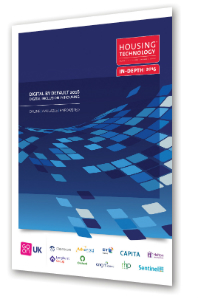Housing Technology – Digital by Default 2016
 Published in conjunction with Go ON UK and kindly sponsored by Aareon, Advanced Business Solutions, BT, Halton Housing, The Longhurst Group, Orchard Information Systems, Origin Housing, RHP and Sentinel Housing, Housing Technology’s ‘Digital by Default 2016’ report is the first significant technology report on digital inclusion in the UK social housing sector since our original 2012 report (published in conjunction with RaceOnline 2012).
Published in conjunction with Go ON UK and kindly sponsored by Aareon, Advanced Business Solutions, BT, Halton Housing, The Longhurst Group, Orchard Information Systems, Origin Housing, RHP and Sentinel Housing, Housing Technology’s ‘Digital by Default 2016’ report is the first significant technology report on digital inclusion in the UK social housing sector since our original 2012 report (published in conjunction with RaceOnline 2012).
Order the Digital by Default 2016 report.
The report is intended to give social housing providers guidance on how to digitally include more of their tenants; not only to improve their lives but also to improve housing providers’ own business performance. The report:
- Covers how leading social housing providers have successfully adopted digital inclusion into their overall business strategies;
- Provides guidance for best practice around digital inclusion strategies in housing, and;
- Shows the results of a comprehensive online survey (highlights below) of UK social housing providers and their views on digital inclusion and their strategies to support it.
Summary of the Digital by Default 2016 survey
- Defining digital inclusion strategies: Over a third of housing providers have no formal digital inclusion strategy.
- Factors preventing tenants getting online: Despite the conventional orthodoxy about why some tenants aren’t online, the most common reasons are a lack of knowledge and confidence. The costs of getting online are seen as least important.
- Measuring digitally-included tenants: Only a quarter of tenants are ‘fully included’ and almost 50 per cent of tenants are not digitally included in any way.
- Budgets & resources: Most digital inclusion budgets and resources are directed towards IT training for tenants. Only a third of housing providers offer tenants specially-priced hardware and software and/or broadband connectivity packages.
- Support from IT suppliers: Most housing providers would like IT suppliers to offer discounted and/or re-conditioned IT equipment and cheaper broadband connectivity packages.
- Factors hindering housing providers’ digital inclusion activities: The cost and complexity of integrating digital inclusion services with existing back-office systems is the most important factor hindering housing providers’ digital inclusion activities.
- Spending on digital inclusion: Most housing providers are spending 0.1-1 per cent of their annual turnover on digital inclusion projects.

